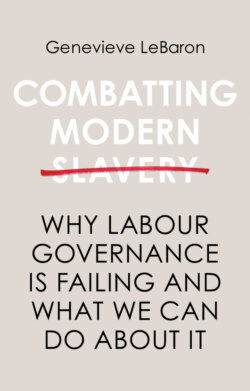Читать книгу Combatting Modern Slavery - Genevieve LeBaron - Страница 16
The recruitment industry
ОглавлениеAs part of the broad political economy dynamics outlined earlier in the book, a booming recruitment industry has emerged within global supply chains, posing major problems for the enforcement of global labour standards. A high and growing proportion of victims of labour exploitation – and especially victims of forced labour and human trafficking – are not part of companies’ core workforces. Rather, they are supplied through long and complex labour supply chains and employed by labour market intermediaries like agencies or brokers. Yet, recruiters and third-party agencies are very poorly regulated, and are inadequately covered (where included at all) in market-based labour governance initiatives. Indeed, as I will argue in Chapter 4, recent governance initiatives may even be fuelling exploitation by the recruitment industry as suppliers facing increased scrutiny by brands are turning to recruiters and labour agents as a strategy to outsource risk and cut costs.
A key part of the story of why labour governance is failing relates to this recruitment industry. In particular, it lies in the dynamics of labour supply chains, how recruiters and agents within them facilitate the transnational supply of vulnerable workers, and the role of the industry in anchoring labour exploitation within the global economy. Due to flaws in both design and implementation, contemporary efforts to govern labour standards have tended not to touch the recruitment industry, and, in doing so, have missed highly vulnerable and exploited workers.
